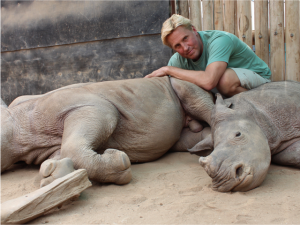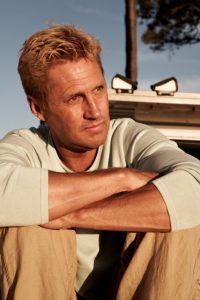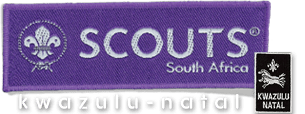
It was at the 2nd Pinelands Cub Pack in Cape Town. Braam joined the Pack when he was 7 as his dad wanted to give him the opportunity to be as close to nature as possible whilst living in an urban suburb. When asked about his Cubbing memories his eyes light up and he starts to laugh. “I remember failing my first badge three times! It was knotting! I just couldn’t get it right. But I practiced and practiced and didn’t give up and got my badge. It was such a great feeling in the end. I got many more badges after that including my Leaping Wolf. Currently I run youth development camps and I make sure that the first thing I teach the kids is a variety of knots! I know the m inside and out,” he quips.
m inside and out,” he quips.
“I also have a fond memory of the first camp I went on with the Scouts. It was along the Bergriver in
Paarl. When you go camping you have fun with your friends and go on adventures, but what often is not spoken about is that when going on a camp you also learn how to handle being away from home, how to manage on your own and overcome your fears. Even though I was eleven years old, I was very homesick on my first camp. In Scouting you do activities that stimulate the use of your senses, I walked over the riverbed blindfolded with my fellow Scouts and had to touch cooked tomatoes to identify what it was. I was very sensitive then, was very scared and couldn’t handle being away from home so the Scouters called my parents and they came to get me. My dad sat me down after that and explained that I had two choices, either I learn to face my fears in the safe environment Scouting provided or I would live with fear for the rest of my life. I opted for the first. I was going to face my fears head on and experience the wilderness! I did hang my head in shame at the next Scout meeting though, but to my surprise everybody was happy to see me, and nobody judged me for going home. That is the Scouting way. When I was 14 I camped alone at Kings Block House for 5 days and was able to survive and face my fears through what I had learnt. I also used to cycle from home to a river called Elsieskraal behind the Scout Hall to catch fish and I caught my first snake there too. I really loved being surrounded by nature.” After a few years Braam had to leave the Scouting Movement but his connection to the wilderness was established.
“Scouters are the determining factors in making Cub Packs and Scout Troops successful.”

“Another important thing I remember is the fact that Scouting teaches you values, morals and how to respect people and the world we live in. Being exposed to the Scouting values has absolutely influenced me to be the person I am today and to see everybody as equals. Scouting brings together people from different backgrounds and makes them all work as a team. You can have a child from a prominent private school and one from a township school and they will both work together when they get over obstacles or go on a hike. I also remember the “Bob a Job” very well. We used to knock on doors and ask if we could do a small job like cut grass or wash a car and earn some pocket money. Obviously in today’s society this would be too dangerous but nevertheless I learnt that you get nothing for nothing and it planted the seed for my current work ethic. What is so pervasive in our modern day society is the habit of assigning blame and exerting a strong sense of entitlement. We should rather say what can I give instead of only what can I get. There is really a lot to be said about the foundations that Cubbing and Scouting lays” says Braam pensively.
“When it comes to personal growth Cubbing is absolutely a confidence booster. Firstly, you are part of a team and don’t want to let your team down. As everybody is seen as an asset and work together a lot is achieved. Secondly, if there is a strong team leader who encourages his team and takes them into nature then the children will grow and thrive. Most kids today have lost their connection with the earth”, says Braam. “Parents send them to the mall for entertainment and underestimate the power of the wilderness, of nature. Being outdoors is not only physically healthy but it’s also an emotional and spiritual healer.”
When talking about his accomplishments such as conquering the Great Wall of China or skiing right up to the South Pole, he ponders and says, “I wonder if I would have succeeded if I had not learnt to face my fears and be alone in the Scouting Movement.” Braam champions a cause called “Do One Thing”. Cubs can join in this cause by doing one thing that will make a difference on the environment such as putting a brick in the toilet tank, making ethical choices in what they eat, close the tap when they brush their teeth, take a shower instead of bathing, etc…
We asked 100 Cubs what the weirdest thing is that they have eaten whilst on a camp. Braam laughs, takes a while to think about this and replies “that would be grasshoppers and scorpions. Venom is a protein so once it has been fried or cooked it gets deactivated!”

